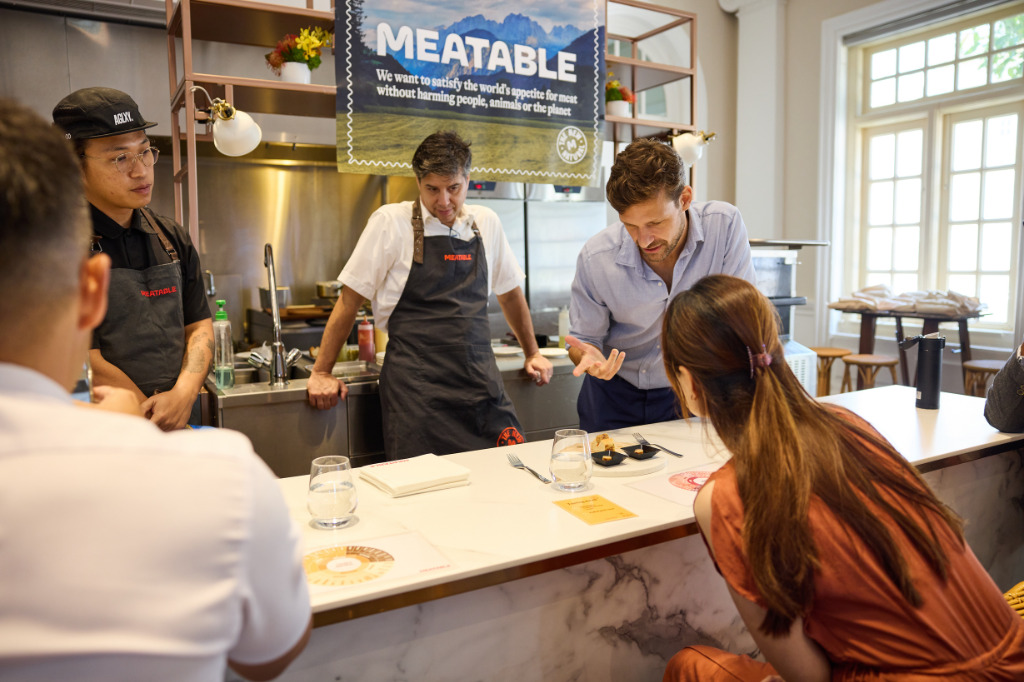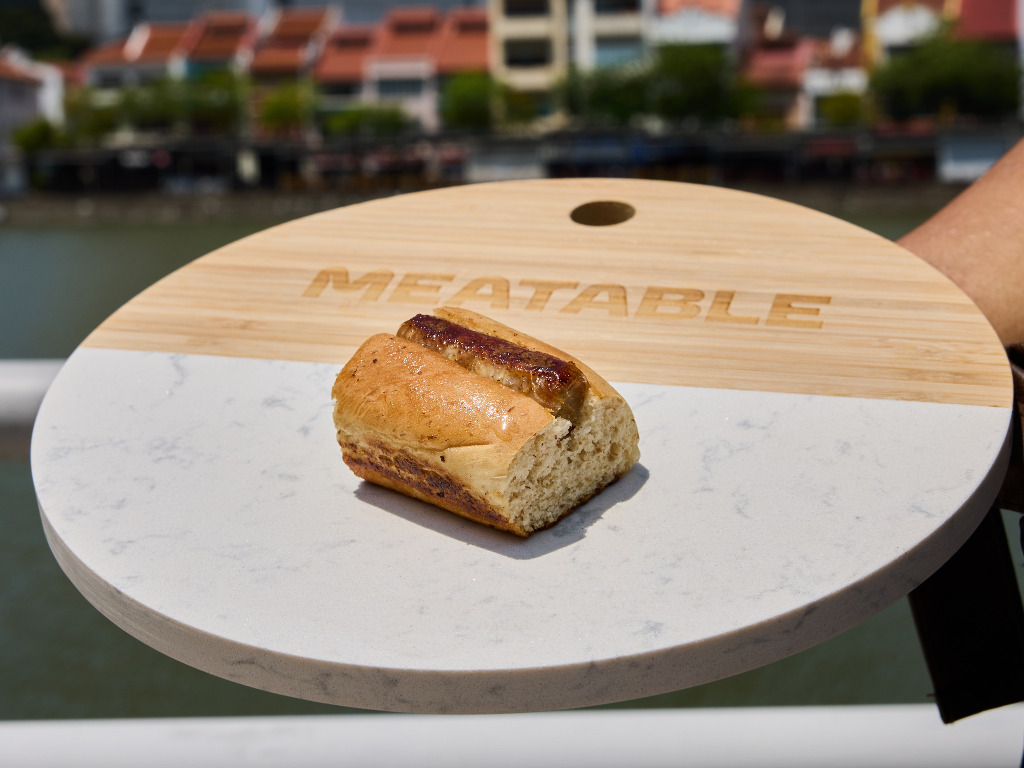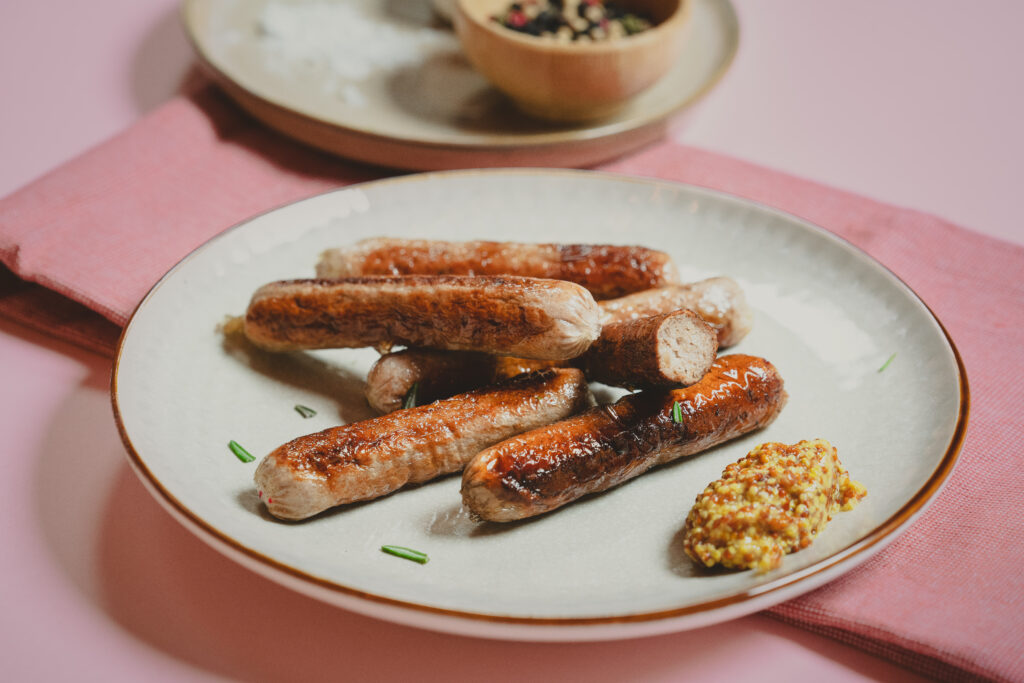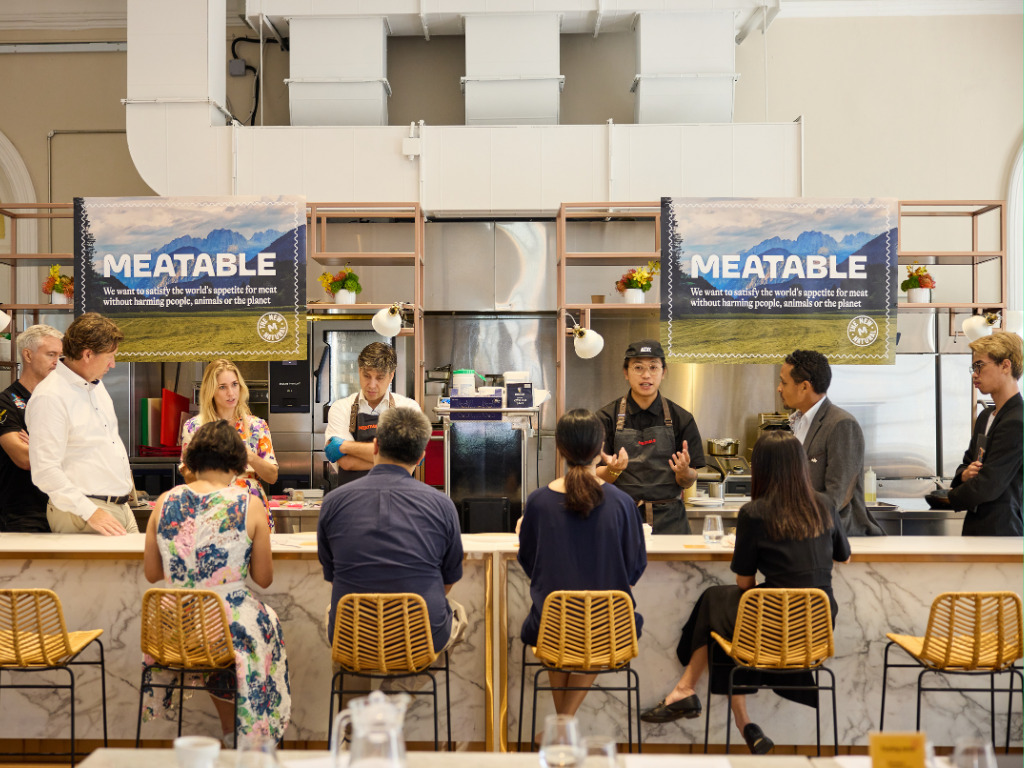Dutch Startup Hosts Successful Cultivated Pork Tasting Event in Singapore Ahead of Planned 2024 Launch
6 Mins Read
Following its first tasting event in May, which involved retail partners and Singapore’s Economic Development Board, Dutch cultivated pork producer Meatable hosted a second such session last week for the media and stakeholders. It demonstrated its cell-cultured pulled pork and sausage products, which it plans to launch in the city-state in mid-2024.
Meatable’s meat alternative is a hybrid cultivated and plant-based product, which it has developed in partnership with Singapore-based Love Handle. The tasting event, held at Love Handle Labs Innovation Centre at The Arts House, featured a version that was one-third cultured meat and two-thirds plant-based, after taste-testing prototypes containing anywhere between 10-50% of cell-based meat.
“We are still in the process of optimising our products and trying out different recipes,” Meatable COO Carolien Wilschut tells Green Queen. “Each recipe is like a puzzle, where all components need to complement each other perfectly. We will keep on working on this to make sure we have the perfect recipe ready for the launch.”
“At our last tasting, participants tasted a hybrid sausage with 33% cultivated meat. The feedback on this was already very positive, but we’re always looking to make our products even better.”
Meatable described the tasting event as “successful”, having received some “invaluable feedback” on the taste and texture of its meat. In her review for The Straits Times, senior environment correspondent Lynda Hong wrote it “can be hard for someone to tell the difference between traditional pork and [Meatable’s] cultivated pork”.
As for the pulled pork, she said it “lacks the fibrous texture, dissolving in the mouth faster than traditionally farmed pork”, but the difference was masked by the sauce, the taco it was wrapped in, and the meat’s own porky flavour. “I never really tried cultivated meat before, and I think it tastes very much like the real stuff,” Hong was quoted as saying by Meatable.

“I feel the product is really, really interesting,” said Daniele Sperindio, Michelin-starred chef at Italian restaurant Art. “Depending on the application, if I wasn’t told, I could be even potentially fooled to think it’s simply pork, like shredded pork and so on.” Meanwhile, Stephan Zoisl from Chef’s Table restaurant, said: “Did I like the cultivated meat? Definitely! It’s a new revolution, kind of. Just from a point of flavour, it tastes like pork, I mean, so it does taste like meat. Definitely, I liked that.”
“We are delighted to have delivered this tasting event in Singapore and humbled by the responses we got,” said Meatable co-founder and CEO Krijn de Nood. “It is a great way for us to collect their feedback and optimise our products even further.”
The path to regulatory approval
Meatable announced it will look to conduct more tastings of its products, both in Singapore and elsewhere. Each event requires safety approval by the Singapore Food Agency, which has “stringent safety requirements and a clear framework of criteria that companies need to meet”. Earlier this year, it collaborated with Mosa Meat, HollandBIO and the Dutch government to create a ‘code of practice’ facilitating cultivated meat tastings in the Netherlands – now, it aims to host its first tasting in its home country late this year.
The news comes just two months after Meatable raised $35M in Series B financing, bringing total investment to $95M to date. The company – which has already applied for regulatory clearance in Singapore (which is one of only two countries that currently allow the sale of cultivated meat, alongside the US) – is aiming for a launch in restaurants in mid-2024. “By that time, we aim to have received approval for commercial sale,” says Wilschut.
In October 2022, Meatable partnered with Singapore’s ESCO Aster, the only regulator-approved contracted cultivated meat manufacturing facility in the world, in its bid towards regulatory approval. De Nood told Green Queen in August that the company will look to expand to the US after the Singapore launch, which Wilschut confirmed.

“We are taking this process step by step, and will use our experience in Singapore to guide us in other countries,” she said. “After Singapore, we are planning to expand to the US. Depending on regulatory developments elsewhere, we will update our strategy accordingly. “
“In order to gain regulatory approval in the US, we’re working with the relevant US experts and authorities on this matter – including the US Food and Drug Administration and the United States Department of Agriculture,” de Noord said in August. “Our application in Singapore gives us useful points of reference as well.”
Patented tech enables faster cultivated meat production
To produce its cultivated pork, Meatable employs a proprietary tech called Opti-ox, which helps it avoid using the controversial fetal bovine serum. Usually, immortalised cell lines require an alteration of the cells to allow them to multiply indefinitely, but Meatable uses pluripotent stem cells (PSCs), which “have the natural ability to keep on multiplying and to do so rapidly” – and these double in just 24 hours.
It can be more challenging to change PSCs from stem cells into specialised cells like muscle or fat, but the Opti-ox tech helps produce real muscle and fat cells that can fully differentiate in eight days, which is 30 times faster than it takes to rear a pig for pork on farms. This technique is paired with a perfusion process allowing Meatable to work in a continuous cycle to produce high cell densities.
“This means we can grow a lot of cells in our bioreactors, and harvest cultured meat from the reactors continuously. This is a great step forward as it increases productivity and makes the process easy to scale,” explains de Nood. “Altogether, this means that when it comes to making real cultivated meat, we have the tools to make the process extremely efficient and one that can scale to serve customers around the world.”

Apart from the ESCO Aster production site and the co-manufacturing facility with Love Handle, Meatable has a plant in the Netherlands too. “We are in the process of moving to our new facility in Leiden,” Wilschut tells Green Queen. “In our previous location, we were working with 50-litre bioreactors, but here we have the possibility to work with larger bioreactors and therefore produce more product. This is an important step for us in scaling up. Next to that, we have started production on the ground in Singapore.”
The tasting is a major step forward in its journey to launch commercially. “This is also an important step towards full regulatory approval for sales in Singapore,” says de Nood. “All this helps us move closer to fulfilling our mission to satisfy the world’s appetite for meat without harming people, animals, or the planet.”




